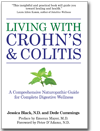Before tackling the gluten-free diet, let’s get to know our culprit.
Gluten is a specific type of protein, but one you won’t find in meat or eggs. Instead gluten is found in wheat, rye, and barley. Going gluten-free means avoiding these grains. A gluten-free diet is essential for most people with gluten allergies or celiac disease, a condition which causes intestinal damage when gluten is eaten.
Going Off Wheat ~ Dede’s Story (from Living With Crohn’s & Colitis)
People always ask me why I cannot eat wheat and I don’t have a clear answer. I remember my naturopath asking me to give up wheat when I was really having digestive issues—mostly constipation and blockages—and I was horrified. “I love pizza and bagels the most,” I pleaded with her. She demurred and suggested I give up wheat for three days to see if that helped my frequent bouts of arthritis due to the long-term flares of Crohn’s disease that had ravaged my joints.
After three days, I was ecstatic, I had more energy, and I felt better all over, especially in my elbows and knees which were frequently arthritic. Four years have now passed, and I switched to the ancient wheat grain, Spelt, for my occasional wheat-fixes (though I typically use rice flour for pastas and pizza crusts). Spelt — HIGH GLUTEN CONTENT — looks very similar to wheat (just ask my seventeen-year-old son who often samples my Spelt concoctions, like pizza dough and scones, and doesn’t notice any difference from the same made with wheat!)
Spelt actually contains more protein than wheat, and since I have given up red meat, I do like getting extra proteinin my diet. In addition, the protein is easier to digest, though there is actually more gluten in Spelt, which makes it an unsuitable grain for those with celiac disease. Here is an awesome gluten-free bread company (their pizza is SO good!) . . .
As far as oats are concerned, I have found this grain to be easier to digest than most other whole grains. NOTE: I only use pure oats, not commercial oats, which are often processed with wheat, and if have celiac disease you MUST stay away from any wheat contamination, according to my research!
According to Diane Lamb, a nutrition and food specialist at the University of Vermont, writing in her excellent column in the Brattleboro Reformer,
“Breakfast can make your day!…A healthy breakfast should energize you, satisfy your hunger and provide beneficial nutrients—carbohydrates, protein, vitamins, minerals, and a small amount of fat…A bowl of cereal (hot or cold) that has some dietary fiber with low-fat milk or yogurt, fruit, and even a few nuts provides a lot more nutrients than an empty calorie food like that sweet roll, or donut. . . . In addition to lowering blood cholesterol, oats (oatmeal) can help control blood sugar and insulin sensitivity. Whole grains including oatmeal are digested more slowly than refined grains. This slower digestion leads to a gradual, steady supply of blood sugar which can keep hunger in check.”
I rely heavily on routine in my diet and lifestyle choices. I always read labels carefully, and I try to cook with McCann’s Steel Cut oats, perhaps as a nod to my Irish heritage, but more importantly, to get the purest grain without any addition of refined sugars, added salt, and flavors. Sometimes the fewer ingredients on the label, the happier I am and more apt to purchase!
~MORE TO COME EVERY FEW DAYS!~
—Dede Cummings
Research from the Mayo Clinic, ThirdAge & WebMD • photography @creativecommons.








wartica
Once I got rid of all processed products, all my skin issues cleared up; it took a little while, but everything eventually got out of me:)) Have a great holiday with your family and friends:))